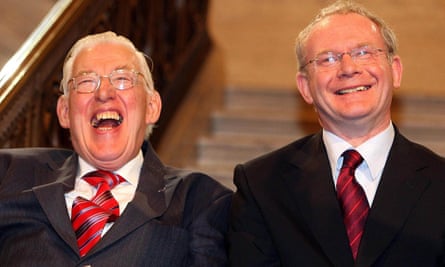For those who put years of hard work into establishing peace and inclusive self-government in Northern Ireland, it’s been painful to observe how local obduracy and Westminster’s incompetence have brought power-sharing to a halt for nearly a year.
Many months ago, both my predecessor as secretary of state, Paul Murphy, and I warned publicly that the deadlock would not be resolved unless the prime minister and the taoiseach took a personal grip, as their predecessors had at top-level summits during the Good Friday process.
But that didn’t happen. Doubtless distracted by Brexit, Theresa May has shown an astonishingly irresponsible indifference. We didn’t get to the 2007 settlement that saw Ian Paisley and Martin McGuinness joined at the hip in office together without John Major, and above all Tony Blair, making it an absolute priority – unlike David Cameron and now May.
Yet, despite the cobwebs growing around Stormont, there is oddly little sense of crisis among Northern Ireland’s citizens. Instead there is something more serious: a sense of weary cynicism and resigned hopelessness that the political class has failed them yet again. It is disturbing that most members of the legislative assembly seem oblivious to the corrosive effect on the democratic process.
MLAs blithely continue to draw their salaries and sail on as the only group of workers in Northern Ireland who get paid without having to turn up for work.
The hope and optimism around those bitter old enemies Paisley and McGuinness ruling together – the most improbable of “chuckle brothers” – have long since expired. While professing to want self-government restored, the Democratic Unionist Party is sitting pretty dictating to the Tories in their quasi-coalition. Similarly, Gerry Adams, once a skilled negotiator for the Good Friday process, now seems more interested in Sinn Féin’s advance within the Irish Republic.

In the absence of determinedly creative government involvement, neither party will budge. The inability to find a way to statutorily recognise the Irish language is a symptom of ineptly dysfunctional negotiation. The DUP’s refusal to countenance this contrasts starkly with the willingness of Paisley and Peter Robinson to find solutions on previous, equally contentious, disagreements.
If the DUP and Sinn Féin – the leaders of unionism and nationalism/republicanism respectively – cannot restore a modus operandi, then maybe the mandatory coalition of the Good Friday architecture will have to be re-examined. It was meant to ensure that no side could dictate to the other: each community’s interest would be protected. Instead it has morphed into mutual veto. That is not sustainable.
Does political paralysis mean a slide back into the Troubles? Probably not. The political conditions for bombing and killing on that horrendous scale no longer exist – partly because the gross discrimination and inequality suffered by the Catholic population have been removed. Nevertheless, a political vacuum will always be filled – often by extremism.
There have already been ugly outbreaks of racism. Dissident republicans still try to bomb and assassinate: the viable pipe bomb left in Omagh on Remembrance Sunday was an ominous example. So too was the knee-capping on Sunday night in Derry. Loyalist gangs still operate. Extremism also feeds off the insecurity and poverty generated by austerity.
The secretary of state for Northern Ireland, James Brokenshire, has just been forced to set Northern Ireland’s budget in an emergency Westminster bill. As the shadow secretary of state, Owen Smith, aptly put it: “The reality is that we are living in something of a twilight zone between devolution and direct rule, with real problems for accountability and transparency.”
Some on the nationalist side have suggested that an alternative to direct rule from Westminster – which would be a catastrophic setback – is to convene the intergovernmental conference provided for in the Good Friday agreement, with Northern Ireland governed in partnership between the Irish and British governments. Yet such joint authority would be a nuclear option for the DUP.
Equally, any further slide to direct rule in the absence of a nationalist voice in the British parliament would be extremely serious: the Social Democratic and Labour party lost its three MPs in June, including its articulate former leader, Mark Durkan. And of course Sinn Féin has never taken its Commons seats.
Meanwhile, Northern Ireland’s health service is in meltdown – a crisis more serious than anywhere else in the UK, which is saying something. Victims of both the Troubles and of historical institutional abuse are crying out for acknowledgement and reparation. And hanging over everything is the awful prospect of a hard post-Brexit border that will do untold damage to the whole peace process. May needs to get a grip before it is too late.

